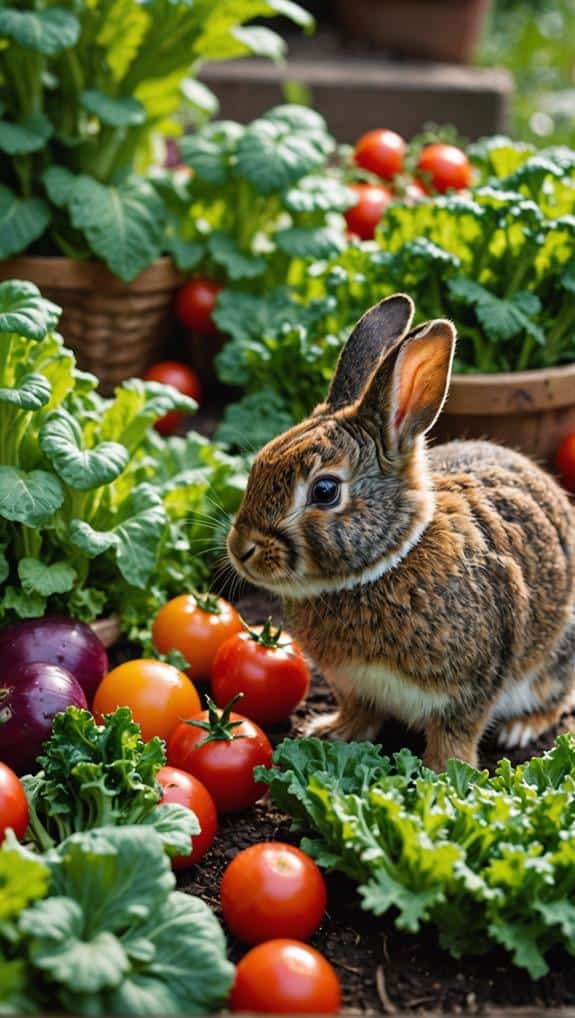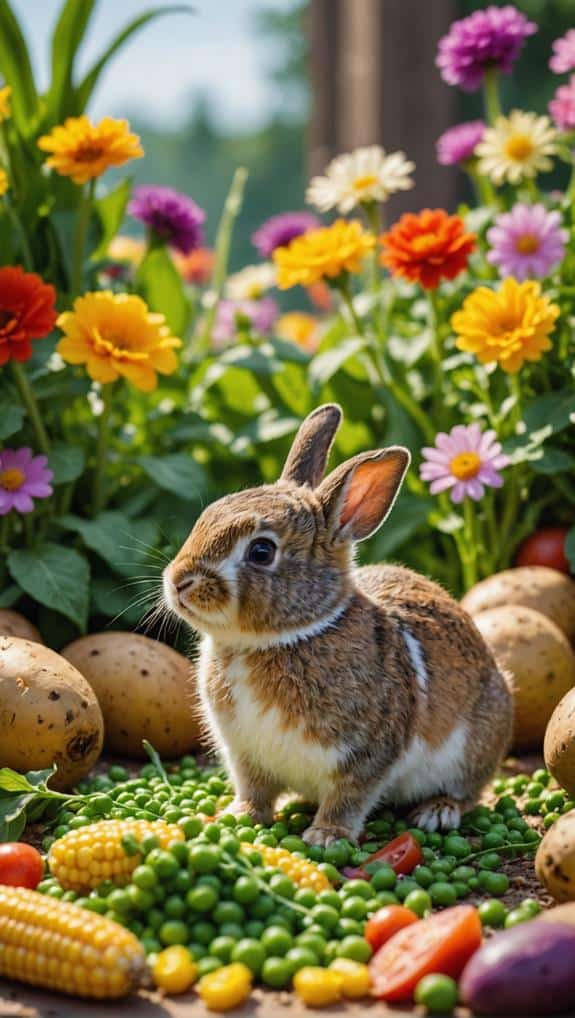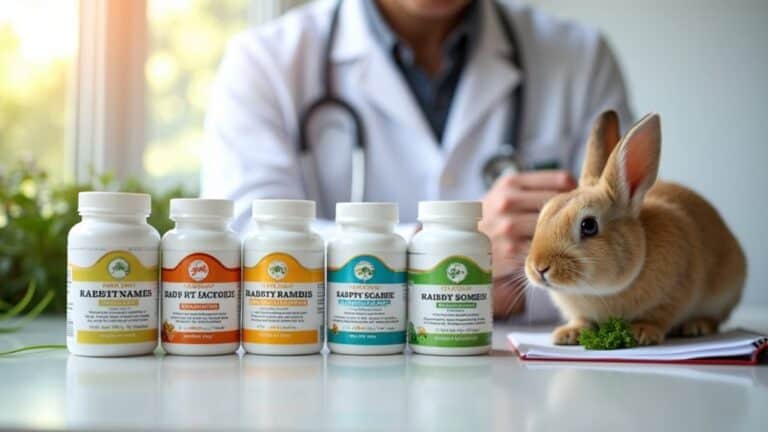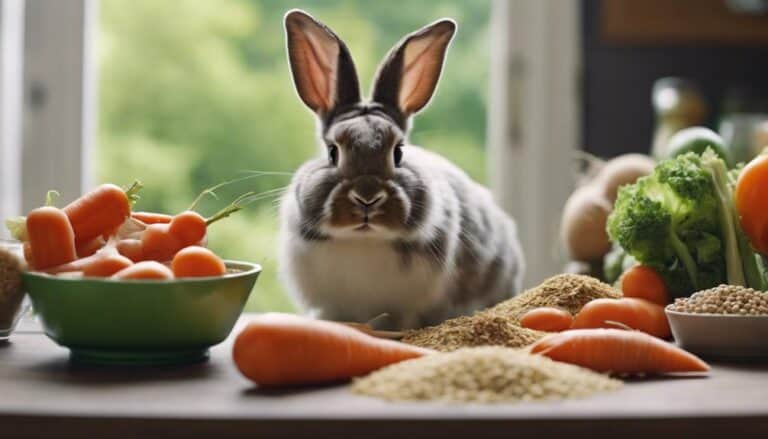It's funny how many new bunny owners you'll find making the same veggie mistakes at the same time. When you're feeding baby bunnies, understanding which vegetables to avoid is essential for their health. You might think all greens are safe, but some can be surprisingly harmful. If you're unsure about which veggies can cause issues or how much is too much, you might be setting your little friend up for digestive problems. Let's explore the common faux pas that can lead to serious consequences for your furry companion.
Contents
Common Vegetable Mistakes

When it comes to feeding baby bunnies, avoiding common vegetable mistakes is crucial for their health and well-being. You need to steer clear of high-starch vegetables like potatoes and corn; these can disrupt their gut balance and lead to serious digestive issues.
Iceberg lettuce also falls short, as it contains lactucarium and offers poor nutritional value, which can reduce their hay consumption. Remember, hay should constitute 80-90% of their diet to guarantee proper gut health and prevent issues related to fiber deficiency, such as digestive problems or overgrown teeth the importance of hay.
When introducing leafy greens, do so gradually. Many varieties can be too harsh for the delicate digestive systems of young rabbits. Safe options include small amounts of romaine lettuce and kale, which can be beneficial when introduced carefully.
It's crucial to remember that fresh fruits should only be given as small treats due to their high sugar content; too much can upset the fragile digestive flora in baby bunnies, leading to health concerns like cecal dysbiosis.
Avoid harmful foods like onions, garlic, and avocados, as these can negatively impact their immune systems and digestion. By being mindful of these common vegetable mistakes, you'll help guarantee your baby rabbits thrive and enjoy a healthy, balanced diet.
Toxic Veggies to Avoid
When it comes to feeding your baby bunny, you need to steer clear of certain vegetables that can be harmful. Foods like potatoes, onions, and avocado can cause serious health issues, primarily due to toxins like persin found in avocados, which can lead to severe health complications.
It's crucial to know the signs of toxicity and what safe alternatives exist, such as leafy greens and safe fruits toxic foods for rabbits.
Harmful Vegetables to Rabbits
Feeding your baby bunny the right vegetables is vital for their health, but some common choices can be surprisingly harmful. It's critical to be aware of harmful vegetables to rabbits that can lead to serious health issues.
For instance, potatoes and their leaves contain toxic compounds like solanine, which can cause severe digestive issues. Onions, including garlic and scallions, disrupt your bunny's immune system, potentially leading to hemolytic anemia. Additionally, high-sugar foods like carrots should be limited, as excessive consumption can lead to obesity and digestive troubles, making it important to prioritize a balanced diet proper nutrition is essential.
Tomato leaves and stems are also dangerous, as they harbor toxins that can be hazardous, even though the fruit itself is safe in moderation. Avocados pose a significant risk as well; their skin and pit contain persin, a toxic compound that can result in serious health complications.
Finally, while iceberg lettuce might seem harmless, it has minimal nutritional value and contains lactucarium, which can cause lethargy and additional digestive issues if included regularly in your rabbit diet.
To guarantee your baby bunny thrives, stick to safe vegetables, and always double-check any new additions to their meals. Your careful choices will help keep them happy and healthy. Additionally, it’s vital to introduce fresh greens gradually, observing how your newborn bunny reacts to each new food. Remember that some vegetables are better suited for young bunnies than others, so researching newborn bunny feeding tips can be immensely helpful. With patience and dedication, you’ll ensure your furry friend grows up strong and full of energy.
Signs of Toxicity
Recognizing the signs of toxicity in your baby bunny is essential for their health and well-being. When introducing fresh vegetables into their diet, be mindful of potential toxic options. Here are some signs of toxicity to watch for:
- Lethargy – A sudden decrease in energy or activity can indicate health complications.
- Digestive Issues – Diarrhea or bloating may suggest that your bunny has consumed harmful rabbit food.
- Loss of Appetite – If your baby bunny refuses to eat, it could be a sign of distress from toxic vegetables.
- Unusual Behavior – Any abrupt changes in behavior, such as aggression or hiding, should raise concern.
Certain vegetables, like potatoes, onions, and avocado, pose serious risks to rabbits. Symptoms of toxicity can escalate quickly, leading to significant health complications if not addressed.
Always prioritize safe feeding practices in your rabbit care routine. If you suspect your bunny has ingested something toxic, consult your veterinarian immediately. By staying informed and vigilant, you can help guarantee a healthy, happy life for your baby bunny.
Safe Vegetable Alternatives
Choosing the right vegetables for your baby bunny is crucial for their health and happiness. While it's tempting to share a variety of veggies, some can be harmful.
Starchy vegetables like potatoes and corn can disrupt your rabbit's gut balance, leading to digestive issues. You should also completely avoid onions, garlic, and scallions, as these can negatively impact their immune systems.
Tomato leaves and stems are toxic, so make sure you only offer the fruit in small amounts. Additionally, high-fat vegetables, such as avocados and olives, pose a significant digestive risk for baby bunnies and should be excluded from their diet.
Instead, focus on safe vegetables that provide high fiber and important nutrients. Leafy greens like romaine lettuce and kale are excellent choices.
These safe vegetables can be gradually introduced, making sure your bunny gets hydration and nutrition without the risk of toxicity. By selecting the right green vegetables, you'll support your baby bunny's overall well-being while keeping them safe and happy.
Always remember, your careful choices play a crucial role in their health!
High-Starch Foods to Skip

Often overlooked, high-starch foods can pose significant risks to baby bunnies' health. These little ones have delicate digestive systems, making them particularly vulnerable to the negative effects of high-starch diets.
To keep your baby bunnies happy and healthy, steer clear of the following foods:
- Potatoes
- Corn
- Legumes
- Beans
These starchy options can disrupt gut balance and lead to gastrointestinal stasis, a potentially life-threatening condition affecting a rabbit's digestive system. Baby bunnies aren't equipped to handle such ingredients, so it's essential to monitor their diet carefully.
Instead, focus on providing them with a safe diet rich in high-fiber hay and appropriate leafy greens. High-fiber hay is critical for their digestion and helps prevent nutrient absorption issues that can arise from consuming high-starch foods.
Overfeeding Fresh Greens
While avoiding high-starch foods is essential for your baby bunnies, it's equally important to pay attention to the quantity and type of fresh greens you offer.
Overfeeding fresh greens can lead to gastrointestinal issues, as their developing digestive systems need a carefully balanced diet. Start by introducing greens gradually, offering small amounts to help your bunnies' tummies adjust without distress.
It's recommended to limit the quantity of fresh greens to about 1-2 tablespoons per 5 lbs of body weight. Focus on low-oxalate options like romaine and parsley, which are gentler on their systems.
High amounts of certain greens can disrupt the delicate bacterial balance in your bunnies' guts, potentially leading to conditions like cecal dysbiosis.
Improper Preparation Techniques

When preparing vegetables for your baby bunny, it's essential to take into account how you do it.
Pre-soaking veggies can help remove any lingering pesticides, but don't forget to chop them into small, manageable pieces to prevent choking.
These simple steps guarantee your little one enjoys a safe and healthy meal.
Pre-Soaking Vegetables
Pre-soaking vegetables for baby bunnies might seem like a good idea to guarantee cleanliness, but it can actually do more harm than good. Here are some key points to take into account:
- Nutrient Loss: Water-soluble vitamins can leach into the soaking water, reducing the nutritional value of the vegetables you're serving.
- Loss of Crispness: Soaked veggies often lose their fresh and crisp texture, making them less appealing and harder for baby bunnies to chew.
- Excess Moisture: The moisture from soaking can promote bacterial growth, putting your little ones at risk for gastrointestinal issues.
- Feeding Preferences: Baby bunnies naturally prefer fresh and crisp food; soggy vegetables can discourage them from eating, affecting their health.
Instead of pre-soaking, simply rinse the vegetables briefly under cold water to remove dirt without compromising their integrity or adding unnecessary moisture.
By taking this extra step, you make certain that your baby bunnies receive nutritious, appealing food that supports their growth and well-being.
Chopping Size Considerations
Properly preparing vegetables for baby bunnies involves cutting them into small, bite-sized pieces to prevent choking hazards and guarantee easy chewing and digestion.
When you're considering chopping size, remember that overly large vegetable pieces can be risky for young rabbits. Their smaller jaws and developing chewing skills make it important to offer food in manageable sizes.
For softer, leafy greens, tear them into smaller sections instead of chopping finely. This approach encourages foraging behavior, allowing your baby bunny to mimic natural eating habits.
When introducing new vegetables, start with small amounts to monitor adaptation. This gradual incorporation helps you observe how your bunny responds to different textures and sizes.
Additionally, for hard or fibrous vegetables, it's vital to finely dice or shred them. This not only aids digestion but also minimizes the risk of intestinal blockages in your sensitive bunny's system.
Unsuitable Treat Alternatives
Feeding baby bunnies requires careful consideration, especially when it comes to treats.
While it's tempting to spoil them, you need to avoid certain foods that can harm their delicate systems.
Here are four unsuitable treat alternatives to steer clear of:
- Store-bought treats: Often loaded with sugars and unhealthy fats, these can disrupt your bunny's digestive health.
- Dried fruit: Though seemingly harmless, dried fruits are high in sugar and can lead to obesity if given too frequently.
- Starchy vegetables: Items like potatoes and corn can upset the gut balance of baby bunnies, resulting in serious health issues.
- Nuts and seeds: These treats are high fat and can disrupt digestion, and may even introduce toxins that are harmful.
Instead of these unsuitable options, focus on fresh greens and vegetables that are safe for baby bunnies.
Remember, a well-balanced diet is essential for their growth and well-being.
Final Thoughts
In the grand tapestry of bunny care, avoiding veggie faux pas is as vital as a maestro conducting a symphony. By steering clear of toxic and high-starch foods, and practicing proper preparation, you're not just nurturing a pet; you're crafting a masterpiece of health and happiness. Remember, a little caution goes a long way in ensuring your baby bunny thrives. So, arm yourself with knowledge and watch your furry friend flourish like never before!






